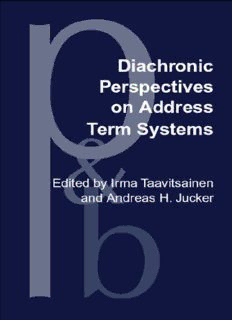Table Of Content<ATSKSWVIUIDUEOZTIBYDOTEFLJWFHTECESHHCOOIEN"ETTRRDFI"DGi1O"a""5SPHc4"0hr"T"a>"rg"omn"2iac2t0icP"ser&speBcteiyvoensdo,nNAewddrSeesrsiesT,erVmoluSmysetem10s7""
DiachronicPerspectivesonAddressTermSystems
Pragmatics & Beyond New Series
Editor
AndreasH.Jucker
UniversityofZurich,EnglishDepartment
Plattenstrasse47,CH-8032Zurich,Switzerland
e-mail:[email protected]
AssociateEditors
JacobL.Mey
UniversityofSouthernDenmark
HermanParret
BelgianNationalScienceFoundation,UniversitiesofLouvainandAntwerp
JefVerschueren
BelgianNationalScienceFoundation,UniversityofAntwerp
EditorialBoard
ShoshanaBlum-Kulka CatherineKerbrat-Orecchioni
HebrewUniversityofJerusalem UniversityofLyon2
JeanCaron ClaudiadeLemos
UniversitédePoitiers UniversityofCampinas,Brazil
RobynCarston MarinaSbisà
UniversityCollegeLondon UniversityofTrieste
BruceFraser EmanuelSchegloff
BostonUniversity UniversityofCaliforniaatLosAngeles
ThorsteinFretheim DeborahSchiffrin
UniversityofTrondheim GeorgetownUniversity
JohnHeritage PaulO.Takahara
UniversityofCaliforniaatLosAngeles KansaiGaidaiUniversity
SusanHerring SandraThompson
UniversityofTexasatArlington UniversityofCaliforniaatSantaBarbara
MasakoK.Hiraga TeunA.VanDijk
St.Paul’s(Rikkyo)University PompeuFabra,Barcelona
DavidHoldcroft RichardJ.Watts
UniversityofLeeds UniversityofBerne
SachikoIde
JapanWomen’sUniversity
Volume107
DiachronicPerspectivesonAddressTermSystems
EditedbyIrmaTaavitsainenandAndreasH.Jucker
Diachronic Perspectives
on Address Term Systems
Edited by
Irma Taavitsainen
UniversityofHelsinki
Andreas H. Jucker
UniversityofZurich
JohnBenjaminsPublishingCompany
Amsterdam(cid:1)/(cid:1)Philadelphia
TM ThepaperusedinthispublicationmeetstheminimumrequirementsofAmerican
8
NationalStandardforInformationSciences–PermanenceofPaperforPrinted
LibraryMaterials,ansiz39.48-1984.
LibraryofCongressCataloging-in-PublicationData
Diachronicperspectivesonaddresstermsystems /editedbyIrmaTaavitsainenandAndreas
H.Jucker.
p. cm.(Pragmatics&Beyond,NewSeries,issn0922-842X;v.107)
Includesbibliographicalreferencesandindex.
1. Forms of address. 2. Historical linguistics. I. Taavitsainen, Irma. II. Jucker,
AndreasH.III.Series.
P40.5.F67 D5 2002
415-dc21 2002034275
isbn90(cid:2)272(cid:2)5348(cid:2)X(Eur.)/1(cid:2)58811(cid:2)310(cid:2)8(US)(Hb;alk.paper)
©2003–JohnBenjaminsB.V.
Nopartofthisbookmaybereproducedinanyform,byprint,photoprint,microfilm,orany
othermeans,withoutwrittenpermissionfromthepublisher.
JohnBenjaminsPublishingCo.·P.O.Box36224·1020meAmsterdam·TheNetherlands
JohnBenjaminsNorthAmerica·P.O.Box27519·Philadelphiapa19118-0519·usa
Table of Contents.qxd 12/18/02 12:43 PM Page v
Table of contents
Preface
. Diachronic perspectives on address term systems:Introduction
Andreas H.Jucker and Irma Taavitsainen
. The T/V pronouns in Later Middle English Literature
David Burnley
. The use oftu/vusin the Anglo-Norman Seinte Resureccion
Tony Hunt
. “And ifYe Wol nat So,My Lady Sweete,Thane Preye I Thee,[…].”:
Forms ofaddress in Chaucer’s Knight’s Tale
Thomas Honegger
. From Pragmatics to Grammar:Tracing the development of“respect”
in the history ofthe German pronouns ofaddress
Horst Simon
. The sytem ofCzech bound address forms until 1700
Michael Betsch
. Family first:Address and subscription formulae in English family
correspondence from the fifteenth to the seventeenth century
Minna Nevala
. Spanish forms ofaddress in the sixteenth century
Paola Bentivoglio
. The co-occurrence ofnominal and pronominal address forms
in the Shakespeare Corpus:Who says thouor youto whom?
Ulrich Busse
. Pronouns and nominal address in Shakespearean English:
A socio-affective marking system in transition
Gabriella Mazzon
Table of Contents.qxd 12/18/02 12:43 PM Page vi
vi Table ofcontents
. Pronominal usage in Shakepeare:Between sociolinguistics
and conversation analysis
Dieter Stein
. Youand thouin Early Modern English dialogues:Patterns ofusage
Terry Walker
. Rectifying a standard deficiency:Second-person pronominal
distinction in varieties ofEnglish
Raymond Hickey
. Demonstrative pronouns in addressing and referring in Finnish
Eeva-Leena Seppänen
. The German address system:Binary and scalar at once
Raymond Hickey
16. (cid:0)Index 427
Preface.qxd 12/17/02 12:52 PM Page vii
Preface
The idea for this volume goes back to a seminar on historical pragmatics at the
ESSE-5 Conference of the European Society for the Study of English held in
August 2000 in Helsinki.Even though the call for papers for this seminar had been
very general,inviting contributions in the vast category ofhistorical pragmatics,it
turned out that many papers dealt with the English address term system.In view
ofthe high quality ofthese papers,we decided to devote a special issue ofthe Jour-
nal ofHistorical Pragmaticsto the topic,but being aware ofthe many highly complex
and interesting systems in other languages,we asked other scholars to contribute
to this special issue as well.In the end the response to our call for papers was over-
whelming and represented more than a double issue of a journal, and thus we
decided that an independent volume would be more appropriate.
We thank all the contributors for their cooperation and patience and for their
willingness to undertake revisions wherever anonymous reviewers or we felt this to
be necessary.We would also like to express our gratitude to a number ofanonymous
reviewers who read and commented on individual papers and thereby improved the
overall quality ofthe volume.Our thanks are due to Rosemary Bock and Carla Suhr
for their careful editorial work.
Very sadly,while the work on this volume was in progress,David Burnley died
after a long illness and his article appears posthumously.His contribution is char-
acteristic of his sophisticated research on Middle English,based on a firm socio-
historical grounding and expertise on a wide spectrum ofissues.It is placed at the
opening position in this volume,as it gives the common background to the Euro-
pean developments and sets the scene for several other articles in this volume.
Introduction (1-26).qxd 4/22/03 10:04 AM Page 1
Diachronic perspectives on address
term systems
Introduction
Andreas H.Jucker and Irma Taavitsainen
University ofZurich and University ofHelsinki
. Preliminaries
Terms of address are words or linguistic expressions that speakers use to appeal
directly to their addressees.In English,for instance,Sir is used in addressing only,
but other words used in addressing like you, Helen, daddy, darling, or Professor
Brown have other functions as well as they are used to talk about other persons
rather than to talk to them,and youcan be used generically.Address terms can take
the form ofpronouns,nouns,verb forms and other affixes (Braun 1998:2;see also
Braun,Kohz and Schubert 1986:xv-xvi).
Pronominal forms ofaddress often distinguish between a familiar or intimate
pronoun on the one hand and a distant or polite pronoun on the other.German,
for instance, distinguishes between du and Sie; Spanish between tu and Usted;
Dutch between jijand U;and Finnish uses sinäand teto refer to a single addressee.
Brown and Gilman (1960:254) introduced the convention ofusing the abbrevia-
tions T and V to talk about the choice between these two pronominal forms of
address in many European languages.The abbreviation T refers to the second per-
son singular pronoun (French tuor Latin tu) that in many languages is used as an
informal and familiar term of address. The abbreviation V, on the other hand,
refers to the more distant or polite pronoun for a single addressee, which is in
many cases the second person plural pronoun (French vous,Latin vos).Scholars
working on Middle English and Early Modern English sometimes employ the
convention ofusing Y as an abbreviation for the second person plural pronoun ye
or youand its different case forms,and T for the second person singular pronoun
and its related case forms.These abbreviations are also used in some papers in this
volume. However, in several languages, or stages of particular languages, there
are more than two forms,e.g.in the German of the seventeenth,eighteenth and
Description:Address term systems and their diachronic developments are discussed in a wide range of European languages in this volume. Most chapters focus on pronominal systems, and in particular on the criteria that govern the choices between a more intimate and a more distant or polite pronoun, as for instanc

